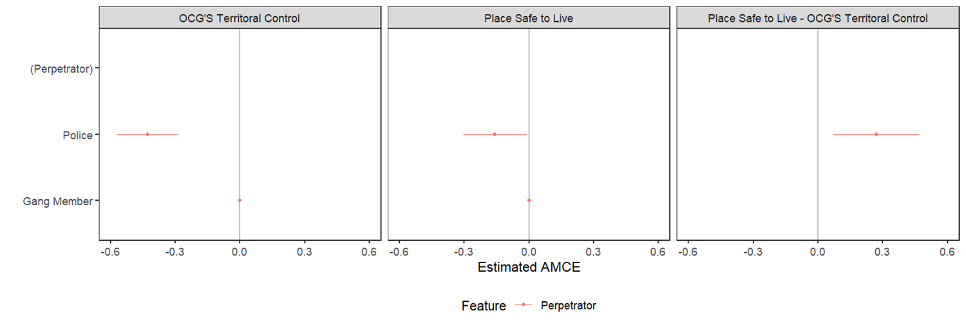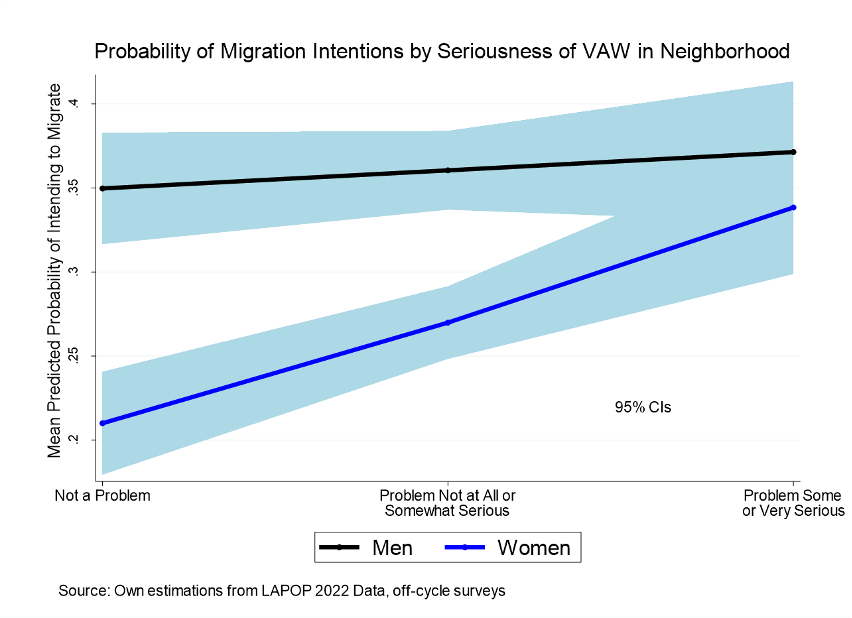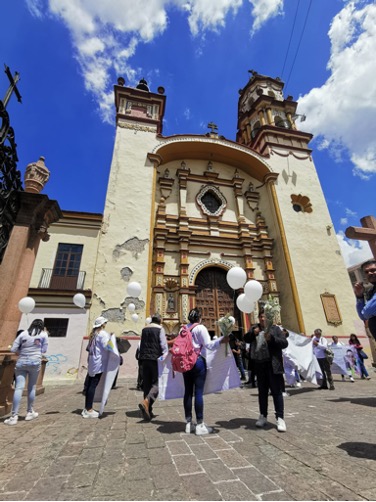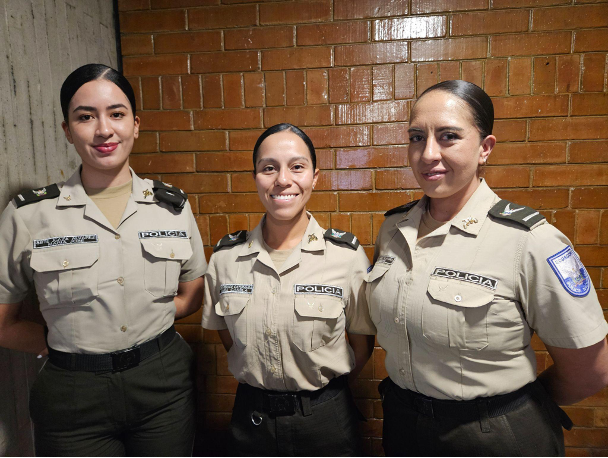RESEARCH E-VAW LAB
Gender-based Violence in Criminal Wars
Although previous research has documented how civil wars and family and individual characteristics make women more vulnerable to gender-based violence, we know much less about how contexts marked by organized crime and the militarization of public security affect women’s exposure to different forms of violence vis-à-vis men. A critical finding from research at the E-VAW Lab shows that women are more likely to experience intimate partner violence in territories where organized crime and state militarization coincide, suggesting that an effective policy response should not only contemplate the provision of specialized services to survivors but also the enactment of public security policy supportive of human rights. The E-VAW Lab examines the topic in a holistic way, evaluating the role of the state in exacerbating and/or reducing gender-based violence.
Book Project: Violence against Women in Multi-Violence Contexts: Militarization and Organized Criminal Groups’ Territorial Control
Abby Córdova
Country: El Salvador
Awards: Harry Frank Guggenheim Distinguished Scholar Award; Kellogg Institute for International Studies’ Faculty Grant
Violence against women is prevalent across the world, undermining women’s opportunities to flourish and live a dignified life. To date, in their evaluation of evidence-based programs to address violence against women (VAW), scholars and policymakers have favored interventions geared toward changing social norms and providing services to survivors. In this book project, Abby Córdova argues that current approaches to respond and prevent VAW, while extremely valuable, are insufficient to significantly reduce VAW rates in challenging contexts in the Global South, where organized criminal organizations (OCGs) dominate large parts of national territories. With the purpose of signaling effectiveness in combating organized crime, governments in the Global South have opted for the militarization of public security, deploying the military and the police in territories controlled by OCGs, which has led to criminal wars and massive human rights violations. As such, policy responses should also include the implementation of public security strategies rooted in the respect of human rights and the rule of law.
This book project broadens our knowledge about how women experience violence vis-à-vis men in criminal wars and its consequences for gender inequality and citizen mobilization to demand justice. More specifically, the book addresses four main questions: 1) What explains gender-based violence against women in criminal wars? 2) How does the population at large respond to gender-based violence in the midst of criminal wars, and what are the implications of such responses for perpetrators’ accountability? 3) How do survivors respond and resist gender-based violence in criminal wars? And 4) What kinds of interventions can effectively increase public condemnation of VAW and support for security policies congruent with women’s safety and the protection of human rights?
The results of her book show that both state and non-state armed actors increase women’s vulnerability to sexual violence in territories controlled by OCGs, lowering both trust in state institutions and reporting rates, thus contributing to widespread impunity and increased intimate partner violence within homes. In the context of criminal wars, to end VAW and promote human flourishing, a shift in public security policies congruent with the promotion of human rights and women’s safety must take place. However, governments will only have the political incentive to shift their security policies if citizens demand it. Besides developing a theoretical framework that explains how criminal wars undermine women’s safety, the book also identifies and empirically tests interventions that can help generate citizens’ attitudinal and behavioral change supportive of women’s safety and a shift in public security policies.
The book project takes a multidisciplinary approach to examine the research questions, drawing from political science, sociology, criminology, anthropology, philosophy, and social psychology. To test the hypotheses, Córdova relies on a mixed method approach, combining unprecedented qualitative and quantitative data from in-depth interviews, victims’ testimonies drawn from court trials analyzed using human coding, machine learning, and artificial intelligence techniques, and a wealth of existing and original survey data, including an original four-wave panel survey with embedded experiments.
Key findings:
- In territories marked by organized criminal groups’ territorial control and militarization, women are more likely to suffer sexual violence as a result of gender violence in the hands of state and non-state armed actors, reinforcing patterns of impunity that also lead to increased intimate partner violence against women within homes.
-
Women experiencing gender violence in those territories seek help from non-governmental organizations at a higher rate than their counterparts in territories not marked by territorial control, highlighting the importance of civil society organizations in women’s quest for justice.

Source: Córdova, Abby. Violence against Women in Multi-Violence Contexts: Militarization and Organized Criminal Groups’ Territorial Control (Book Project). Survey data collected in April of 2023 in El Salvador.
-
Public opinion is more tolerant of all violent acts, including sexual violence, when the perpetrator is a state armed actor than a member of an organized criminal organization (OCG). When the perpetrator is depicted as a state armed actor rather than a gang member, the public is less likely to feel anger toward the perpetrator and compassion toward the victim, particularly if told that the violent act occurred in a territory marked by gang control.
Conjoint Experiment: Anger toward the Perpetrator

Gender and International Migration

southern border of Mexico, Tapachula City, Chiapas (photo by A. Córdova
Project part of larger research program on international migration: Understanding International Migration through the Lens of Gender
Abby Córdova, Diana Orcés (Public Religion Research Institute), Jonathan Hiskey (Vanderbilt University) & Mary Malone (University of New Hampshire)
Country: El Salvador, Guatemala, and Honduras
To understand the changing profile of migrants, in prior work we have examined the impact of crime victimization (Hiskey et al. 2018) and broader perceptions of insecurity on Central Americans’ migration intentions (Córdova et al 2022). Particularly for women, we have found that crime victimization increases the likelihood of migration, especially when it is not just women themselves who are victimized, but other people living in their households (Hiskey et al 2019). In this paper, we narrow our focus to understand more clearly how violence against women (VAW) shapes women’s intentions to migrate in Northern Central America. VAW is distinct from other types of criminal victimization as it frequently occurs in both public and private spheres, and is often dismissed by state agents who ignore (or are even complicit in) the pervasive violence that threatens women throughout their daily lives.
VAW, in all of its forms, is pervasive throughout the Americas but particularly so among the northern Central American countries of Guatemala, Honduras, and El Salvador (Carey, et al. 2010; Menjívar and Walsh 2017; 2016; Navarro-Mantas 2018; Wilson 2014; Obinna 2019; 2021). Across virtually any metric one might use, these three countries stand out for their levels of VAW, the depth of impunity that exists for gender-based crimes, and, often, for the degree to which agents of the state are involved in the perpetuation of these daily forms of violence. Though such gendered violence has long been a feature of northern Central America, only in the past decade or so does it appear that these particular forms of violence have emerged as primary drivers of the emigration decision for hundreds of thousands of women from the region, producing starkly distinct emigration patterns and challenging long-held views of women's migration as tied primarily to the migration patterns of men (Córdova, et al. 2022; Menjívar and Walsh 2017; 2016; Wilson 2014; Obinna 2021).
What we have seen in recent years is a highly gendered migration dynamic emerging that we contend has its roots in the distinct forms of everyday violence against women on the part of both private- and public-sector agents in this region. We further explore these dynamics through analysis of survey data on violence against women collected by Vanderbilt University's LAPOP Lab in 2022. We find a highly gendered dimension to the emigration decision that is shaped primarily by the everyday context of gender-based violence that both men and women occupy but that has substantially different, gendered, effects on the emigration decision itself.
Key preliminary findings
On average, men are more likely to intend to migrate than women in Northern Central American countries. However, women who report violence against women (VAW) as a serious problem in their neighborhood express a significantly higher probability of planning to emigrate, independent of perceived threats from other crimes. Women’s probability jumps from 21 to 34 % on the VAW scale, closing the gender gap in migration intentions. Further, women reporting VAW as a serious problem in their neighborhood are more likely to have already attempted and intend to migrate in the future, suggesting that VAW is an important driver of repeated migration in the region. Taken together, the results suggest that addressing the gendered root causes of international migration necessitates the implementation of policies to address violence against women. Moreover, those policies are more likely to prevent forced and repeated migration when implemented locally, given the variations in levels of VAW that exist across sub-municipal territories.

Recent findings also highlight US citizens’ attitudes toward immigrants depending on their gender.US citizens are more inclined to consider immigrant entry to the US when immigrants are women and have migrated due to sexual violence, particularly in the hands of organized criminal groups.
However, US citizens are less inclined to consider immigrant entry to the US when:
a. Immigrants’ gender is non-binary—that is, immigrants do not recognize themselves as women or men;
b. Immigrant’s gender is non-binary and they have suffered sexual violence in the hands of gangs (compared to women having a similar experience).
c. Immigrant women (rather than immigrant men) are traveling either with a spouse or children
Together, these findings suggest that citizens’ support for immigrants is crucial for proposing and implementing U.S. immigration policies tailored to immigrants’ needs. However, support needs to be wide-ranging to result in comprehensive U.S. immigration strategies that respond to the needs of immigrants of all genders. Fostering citizen empathy towards undocumented immigrants needs tailored interventions that account for the gender of immigrants.
The Gendered Risks of Social Mobilization and Political Leadership

agreement between the Colombian government and the former guerrilla group FARC-EP (photo by Isabel Güiza-Gómez)
Existing research has shown that transitioning contexts like civil war peace processes and transitions to democracy challenge patriarchal hierarchies and further increase political opportunities for improvements in women’s rights and political leadership. On the ground, however, women still face high risks to mobilize politically. The E-VAW Lab investigates the gendered risks of social and political leadership in post-accord contexts and citizens’ responses to their political mobilization.
Research Project: Explaining Post-War Attitudes toward Violence against Grassroots Peacebuilders: The Case of Colombia
Abby Córdova and Isabel Güiza-Gómez
Country: Colombia

against social movement leaders and former insurgent combatants (photo by Isabel Güiza-Gómez)
Policy Brief Presentation - Bogotá, 14 de junio de 2024
Prior scholarship commonly assumes that citizens strongly reject systematic (mass) violence against civilians during civil wars. Such assumption is even more widespread in post-accord settings where transitional justice mechanisms such as truth commissions, trials, and reparation programs intend to bring about justice to victims, redress civil war wrongdoing, and challenge wartime beliefs that justified widespread violence. Yet, the public often fails to condemn political violence against civilians, both lethal and non-lethal, even after peace accords that bring wars to an end.
In this article, we seek to explain citizen attitudes toward violence against key actors leading peacebuilding processes at the grassroot level (e.g., ex-combatants and social leaders), who are often targets of post-war violence. We argue that citizen disregard for violence against grassroots peacebuilders responds to system justification attitudes triggered by perceptions of threat ingrained in war rhetoric against redistributive demands and contentious forms of mobilization—what we term subversive stigma. Further, we posit that those attitudes are reinforced by the salience of peace agreements that not only encourage widespread participation of demobilized guerrillas and historically marginalized groups who have suffered war the most (e.g., women and indigenous populations) but also enshrine redistributive reforms aimed at reshuffling previous socio-economic orders.
We test our theoretical framework in the context of Colombia where thousands of social leaders and ex-guerrilla members have been assassinated after the signing of the 2016 peace agreement. Empirically, we innovatively employ a two-staged research design based on a panel survey that combines qualitative and quantitative data to explain attitudes toward post-war violence against FARC-EP ex-combatants and social leaders in Colombia. The baseline survey allows us to gather qualitative and quantitative observational data to empirically test our assumptions and refine the design of a conjoint experiment embedded in a subsequent survey. The experiment varies grassroots peacebuilders’ identity (FARC-EP ex-combatants or social leaders) and their personal traits (gender and ethnicity) as well as their claims, forms of mobilization, and salience of the peace accord provisions that promote ample political participation.
Research Project: Gender-based Violence and Political Engagement Predispositions
Abby Córdova and Angie Torres
Country: Mexico
We seek to examine the link between violence and political participation through the lens of gender, while evaluating this relationship in realistic scenarios that vary the identity of perpetrators and those seeking justice for victims, as well as examining how personal experiences with different forms of violence shape individuals’ responses to violent acts. More specifically, we address three research questions: 1) Compared to other types of crime, does making gender-based violence salient increase or decrease predispositions to engage in politics, independent of personal experiences with violence? 2) compared to non-victims, are victims of gender-based violence more likely to alter their predispositions to engage in politics when gender-based violence is salient? and 3) under what conditions are both crime victims and non-victims more likely to engage in politics in light of cases of gender-based violence vis-a-vis other types of crimes?
Building on existing literature, we examine how crime victimization varied among critical dimensions such as perpetrator type, type of violence, and information source, affects citizens’ propensity to participate in politics. We make three central claims: 1) that a respondent's propensity to participate is conditional on the victim’s gender, 2) on the type of violence made salient (gender or non-gender based violence), and 3) on respondents’ personal experiences with violence. Moreover, we propose that situational factors related to the perpetrator’s identity and who is denouncing the violent act are similarly important in mobilizing the public against violence. To evaluate our theoretical propositions, we conduct a multidimensional factorial survey experiment in Mexico, a country with a high incidence of multiple forms of violence, including gender-based, committed by state and non-state actors, and where relatives of victims and civil society organizations are engaged in seeking justice for victims.
Research Project: Buscadoras: Women’s Mobilization for Justice in Patriarchal Conflict Settings
Abby Córdova, Laura López, Mayra Ortiz, and Natán Skigin

(photo by Laura López-Pérez)
One of the most compelling yet underexplored phenomena in victim mobilization during violent conflict is the predominance of women—mothers, wives, sisters, and daughters of those disappeared or extrajudicially killed—at the forefront of these movements. This trend is evident in family-based victim organizations worldwide, including Argentina’s Madres de Plaza de Mayo, Brazil’s Mães de Maio, and Turkey’s Saturday Mothers. These mobilizations challenge the common assumption that men are more likely to engage in politically contentious activism.
We argue that, while feelings of guilt may drive some women to seek justice for their relatives, many are motivated by strategic considerations: to mitigate risks for male relatives, perceived as more vulnerable to victimization, or to enhance the effectiveness of their activism, as women are often viewed as benevolent and legitimate caregivers. To test this framework, we examine the Mexican context, where mothers are at the forefront of efforts to locate their disappeared children and pursue justice. Our study includes a unique survey conducted among relatives of disappeared persons with varied levels of involvement in 23 colectivos (groups) mobilizing for justice across Mexico. This survey embedded two experiments testing the impact of gender norm salience and perceived legitimacy on respondents’ attitudes toward responsibility and efficacy in searching for the disappeared, investigating whether these effects vary by respondent gender. To date, we have gathered responses from 869 relatives across 26 Mexican states.
Through this research, we seek to honor the memory of the women leading the quest for justice for their families.
Institutional Responses to Tackle Gender-Based Violence

November 2023 (photo by Abby Córdova)
Findings from the Notre Dame E-VAW Lab suggest that to ensure girls and women’ safety in cities, particularly in those marked by organized crime, it is important to adopt policy responses that accounts for the distinct ways in which girls and women experience violence. While men are the main victims of homicides, girls and women are more likely to experience lethal and non-lethal gender-based violence. As such, integral policy strategies involves focusing on reducing both homicide rates and gender-based violence, preventing gender-based violence and increasing survivors’ access to services.
Research Project: Research Program Examining the Effectiveness of Specialized Police Units
Abby Córdova
Countries: El Salvador and Brazil
As a response to gender-based violence, several countries across the world have adopted specialized police units led by women or with a higher representation of female police officers. Besides preventing violence against women, these police units seek to increase access to specialized services to survivors, including shelters, health services, and legal advice. Recent studies for a few countries across the world have presented mixed evidence about the effects of women’s police stations on reporting rates, gender-based violence, and citizen’s perceptions of police legitimacy in the towns where these police stations operate, thus —suggesting that variations in specialized policing design and service provision results in divergent outcomes. Research at the Notre Dame E-VAW builds on and contributes to this research by examining evidence on the effects of a higher representation of women in the police on citizens’ attitudes toward the police and gender-based violence as well as impacts on the incidence of violence against women and reporting rates in the context of Brazil and El Salvador.
Key Findings (Evidence from El Salvador):
Results from a survey experiment in El Salvador carried out in August of 2023 shows that women find the police more legitimate to address violence against women when a higher representation of women in the police is primed using photos that vary the gender composition of specialized police units.
More specifically, making women aware of the existence of specialized police stations as such does not increase women’s perceptions of police legitimacy. Only when women learn that female police officers are leading specialized police stations do they express higher levels of police legitimacy. By contrast, men’s perceptions of police legitimacy remain largely intact when they become aware of the existence of specialized police units, regardless of their gender composition.
Further, women favor allocating a higher share of the total police budget to specialized police units, independent of their gender composition, denoting women’s support for policies aimed at addressing gender-based violence. However, men are only more likely to prefer a higher budget allocation to specialized police units when these are led by both men and women rather than only women police officers. Taken together, the results suggest that men are more likely to support gender policies aimed at improving women’s safety depending on policy design.
Research Project: Do Street Campaigns to Prevent Sexual Harassment in Public Spaces Work? Experimental Evidence from a Real-Life Campaign in El Salvador
Abby Córdova with the support from UN Women, El Salvador
Country: El Salvador
Previous literature has extensively documented that women suffer higher rates of sexual harassment in public spaces within cities, particularly in countries of the Global South (Fileborn and Tully O’Neill 2023; Infante-Vargas and Boyer 2023, UN Women 2017). By fielding an experiment embedded in a face-to-face survey in El Salvador, we seek to identify whether a real-life campaign to prevent sexual harassment can result in attitudinal and behavioral shifts supportive of women's safety. The survey includes a campaign directed to educating individuals about the law, stating that sexual harassment is a crime. Respondents are recruited in public spaces of downtown San Salvador as part of UN Women flagship initiative, Safe Cities and Global Spaces. In the Latin American context, a similar survey was conducted in Mexico, sponsored by UN Women (UN Women 2019). The sample design includes an oversample of areas with public transportation services, allowing us to interview public transport users—which tend to suffer sexual harassment at higher rates.


Numerators and respondents in San Salvador, November, 2024.

Preliminary research findings will be disseminated through a policy brief co-edited by the Kellogg Institute and UN Women, El Salvador in late Fall 2025.
Institutional Responses to Prevent Gender-Based Violence
Research Project: Ending Poverty by Addressing Violence against Women from the Bottom-Up: An Evaluation of “Gender Violence Alerts” in Mexico
Abby Córdova, Sandra Ley, Celine Gonzalez. Research assistants: Géssica de Freitas, and Mariana Guevara, and Helga Jáuregui Ballesteros.
Country: Mexico
Across the world, poverty affects women disproportionately, largely because gender-based violence is widespread—negatively impacting every aspect of women’s life, including their health, freedom, and access to education and economic opportunities. Globally, one in three women have been subjected to physical and/or sexual violence in their lifetime. Not surprisingly, international development agencies have proclaimed that, “to end poverty you have to eliminate violence against women.” However, we lack robust evidence on how to effectively address violence against women (VAW) in challenging contexts, such as those where organized crime and militarized state responses have increased VAW rates.
This project evaluates an unprecedented strategy that relies on local knowledge and engagement to bring down VAW rates and potentiate women’s economic empowerment: Mexico’s Gender Violence Alerts Program (GVAP). Using qualitative and quantitative methods, including experimental and quasi-experimental designs, we examine three main questions:
- What are the impacts of GVAP on VAW rates?
- What are the impacts of GVAP on women’s economic empowerment?
- Which interventions can enhance the impact of GVAP on VAW and poverty elimination?
The research team has compiled the novel dataset Mexico Eliminating Violence Against Women (MEX-E-VAW), which records formal applications and institutional responses in the Gender Violence Alerts Program across Mexican municipalities. Specifically, this dataset registers the application date, requesting actors (e.g., civil society organizations, state human rights commissions), legal grounds for the request (e.g., femicide rates, disappearances), the commission’s admission or rejection date, alert declaration date, and initial courses of action. This dataset also integrates existing data on population, gender-disaggregated poverty indicators, municipal electoral results, women’s protest events, and statistics on gender-based violence incidents. The following figures showcase major trends observed in this dataset.
Figure 1. Treated and Not-Treated Municipalities in the MEX-E-VAW Dataset (Treated=Gender Alerts have been approved)

Figure 2. Gender Alerts’ Approval Year Across Municipalities

Figure 3. Average Femicide Rate by Gender Violence Alert Status 2005-2024






